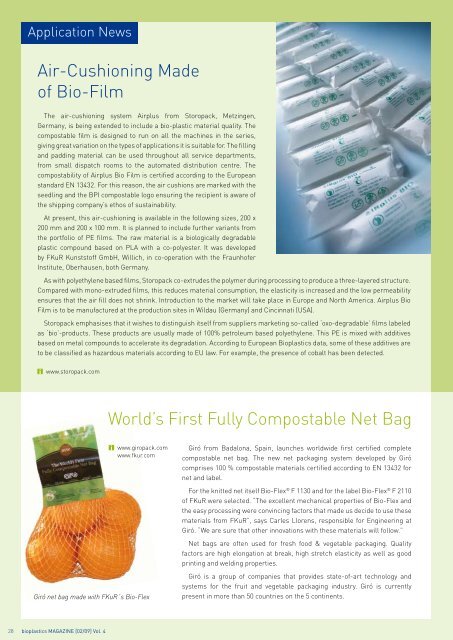bioplasticsMAGAZINE_0902
bioplasticsMAGAZINE_0902
bioplasticsMAGAZINE_0902
You also want an ePaper? Increase the reach of your titles
YUMPU automatically turns print PDFs into web optimized ePapers that Google loves.
Application News<br />
Air-Cushioning Made<br />
of Bio-Film<br />
The air-cushioning system Airplus from Storopack, Metzingen,<br />
Germany, is being extended to include a bio-plastic material quality. The<br />
compostable film is designed to run on all the machines in the series,<br />
giving great variation on the types of applications it is suitable for. The filling<br />
and padding material can be used throughout all service departments,<br />
from small dispatch rooms to the automated distribution centre. The<br />
compostability of Airplus Bio Film is certified according to the European<br />
standard EN 13432. For this reason, the air cushions are marked with the<br />
seedling and the BPI compostable logo ensuring the recipient is aware of<br />
the shipping company’s ethos of sustainability.<br />
At present, this air-cushioning is available in the following sizes, 200 x<br />
200 mm and 200 x 100 mm. It is planned to include further variants from<br />
the portfolio of PE films. The raw material is a biologically degradable<br />
plastic compound based on PLA with a co-polyester. It was developed<br />
by FKuR Kunststoff GmbH, Willich, in co-operation with the Fraunhofer<br />
Institute, Oberhausen, both Germany.<br />
As with polyethylene based films, Storopack co-extrudes the polymer during processing to produce a three-layered structure.<br />
Compared with mono-extruded films, this reduces material consumption, the elasticity is increased and the low permeability<br />
ensures that the air fill does not shrink. Introduction to the market will take place in Europe and North America. Airplus Bio<br />
Film is to be manufactured at the production sites in Wildau (Germany) and Cincinnati (USA).<br />
Storopack emphasises that it wishes to distinguish itself from suppliers marketing so-called ‘oxo-degradable’ films labeled<br />
as ‘bio’-products. These products are usually made of 100% petroleum based polyethylene. This PE is mixed with additives<br />
based on metal compounds to accelerate its degradation. According to European Bioplastics data, some of these additives are<br />
to be classified as hazardous materials according to EU law. For example, the presence of cobalt has been detected.<br />
www.storopack.com<br />
World’s First Fully Compostable Net Bag<br />
www.giropack.com<br />
www.fkur.com<br />
Giró net bag made with FKuR´s Bio-Flex<br />
Giró from Badalona, Spain, launches worldwide first certified complete<br />
compostable net bag. The new net packaging system developed by Giró<br />
comprises 100 % compostable materials certified according to EN 13432 for<br />
net and label.<br />
For the knitted net itself Bio-Flex ® F 1130 and for the label Bio-Flex ® F 2110<br />
of FKuR were selected. “The excellent mechanical properties of Bio-Flex and<br />
the easy processing were convincing factors that made us decide to use these<br />
materials from FKuR”, says Carles Llorens, responsible for Engineering at<br />
Giró. “We are sure that other innovations with these materials will follow.”<br />
Net bags are often used for fresh food & vegetable packaging. Quality<br />
factors are high elongation at break, high stretch elasticity as well as good<br />
printing and welding properties.<br />
Giró is a group of companies that provides state-of-art technology and<br />
systems for the fruit and vegetable packaging industry. Giró is currently<br />
present in more than 50 countries on the 5 continents.<br />
28 bioplastics MAGAZINE [02/09] Vol. 4


















